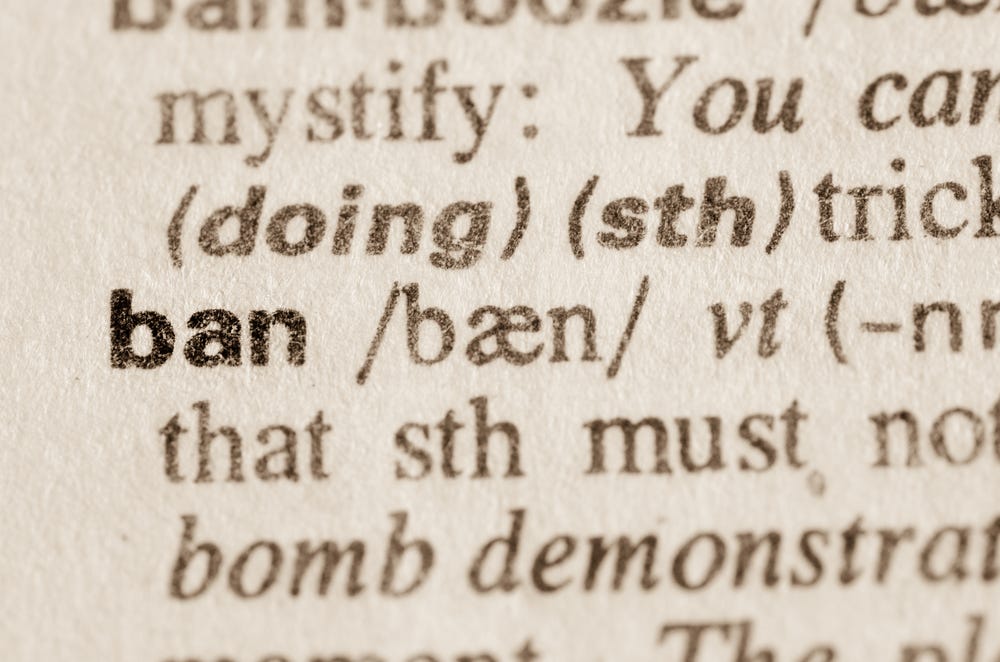E-Pluribus | June 28, 2023
The Book Banned-wagon; too many secrets; and cancellation by association.
A round-up of the latest and best writing and musings on the rise of illiberalism in the public discourse:
Dave Seminara: The Left Twists the Meaning of “Book Ban”
If conservatives as a whole are really book-banners, they are the least effective book-banners in history. At City Journal, Dave Seminara puts things in perspective and explains that most objections to books amount to questions of age-appropriateness and that the left is distorting the issue.
The first definition of the word “banned” in the Merriam-Webster dictionary is “to prohibit especially by legal means.” So when Americans hear claims from the Left that, say, Florida governor Ron DeSantis is “banning books,” they often incorrectly take those words at face value, assuming that the books have been removed not just from school libraries but also public libraries and bookstores.
I live in Florida and recently tested the availability of six well-known “banned” books that have been removed from some school libraries here. I had no trouble getting any of them at my public library—but I was shocked that anyone would purchase books with such graphic adult content for a school library.
[ . . . ]
PolitiFact recently fact-checked DeSantis’s claim that no books have been banned in Florida. They rated his statements false—not misleading or partly true or needing context—because the American Library Association and other left-leaning groups define the word banned in a much broader way than the commonsense definition. The ALA defines a ban as “the removal of a book based on a person or group’s objection.”
According to a recent report cited in the Wall Street Journal, a total of 1,269 book challenges were filed at libraries (public and school) nationwide in 2022. With more than 117,000 libraries in the U.S., this means that less than 1 percent of libraries received even a single challenge.
Read it all.
Michael J. Ard: Can Our Government Keep a Secret?
“Too many secrets” [spoiler alert!] was the conclusion in the 1992 Robert Redford movie Sneakers, and Michael Ard at Discourse Magazine couldn’t agree more. While Ard doesn’t condone the type of actions portrayed in the movie, he argues that a system involving so many people and so much secret information is incompatible with our democracy.
Although the White House has downplayed the seriousness of the Teixeira leak, the media has been reluctant to publish the compromised intelligence reports themselves. This is probably because the documents offer some insight into how the Pentagon thinks the war in Ukraine is going (the short answer: Ukraine is far from winning), and the media has been loath to report criticism of the conflict. In any event, the press arbitrates what classified government documents the public gets to see.
In response to the leak, Senators Mark Warner (D-Va.) and John Cornyn (R-Texas) are sponsoring bipartisan bills to cut back on the amount of intelligence that is considered sensitive and therefore must be protected, a problem termed “overclassification.” Their initiative is sensible, but it is unlikely to achieve its goals. The expansion of the intelligence bureaucracy by definition means more classified information and more security-clearance-holding employees. Moreover, secrecy is the nature of bureaucracy. Security procedures can always be tightened, but the bloated bureaucracy renders overclassification and leaking inevitable.
[ . . . ]
But the bureaucracy, not the policy decision to overclassify, is itself the issue. The late U.S. Senator Daniel P. Moynihan noted in “Secrecy: The American Experience” that the very nature of bureaucracy requires a jealous guarding of information. Secrecy, he claimed, is simply regulation. Intelligence agencies regulate access to information, and this information is their main product. The government is not going to give up or lessen this basic authority.
Secrecy is necessary when national security is obviously at stake, but sometimes the lack of transparency leads to grave policy mistakes and covers up abuses of power. As Moynihan stressed, excessive secrecy has contributed to some of the worst political controversies in recent U.S. history, such as Watergate, the Iran-Contra Affair and—more recently—Russiagate.
In the balance, Moynihan believed the secrecy regime was not worth the cost of U.S. democracy. He declared that, ultimately, “secrecy is for losers.”
Read it all here.
Sam Kahn: How Not To Cancel Russia
By their very nature, wars are going to provoke reactions that are out of proportion with those that would take place under normal circumstances. Nevertheless, Sam Kahn writes at Persuasion, the principles of free expression should still rule the day even in the present conflict in Russia and Ukraine, and there are better ways of holding the Russian government accountable that do not implicate an entire people or culture.
On June 6, Elizabeth Gilbert announced the publication of her new novel The Snow Forest, described by the publisher as “a dramatic story of one wild and mysterious girl in a pristine wilderness.”
Less than a week later, Gilbert, who is best known for her mega-best-selling Eat Pray Love, released a Twitter video canceling The Snow Forest’s publication. “I’m removing the book from its publication schedule. It is not the time for this book to be published,” she said.
The issue had nothing to do with the book’s plot—the story of a family of religious fundamentalists that retreated from civilization for 40 years—and everything to do with its setting. The “pristine wilderness” in question is Siberia. And, in the week since announcing the book, Gilbert had, she said, “received an enormous, massive outpouring of reactions and responses from my Ukrainian readers … about the fact that I would choose to release a book into the world right now—any book, no matter what the subject of it is—that is set in Russia.”
[ . . . ]
But the slippery slope is there and we encounter it in the cancellation of Russian figures regardless of their actions. If, for instance, the astonishingly brave [Marina] Ovsyannikova is not allowed to hold an event in Kyiv, a different logic is obviously at work, one in which individual responsibility is negated and “Russianness” alone is a form of guilt. That’s a logic that democratic regimes have studiously avoided at least for the last century. To take the most extreme example, that of the reconstruction of Germany and Japan, culpability was understood as ending with active members of the regime, and the population as a whole was viewed if not exactly as innocent then certainly as redeemable. Meanwhile, the self-cancellation of The Snow Forest takes the logic of collective guilt to such a point of absurdity that, as The New York Times writes, there has been a significant “backlash to the backlash.”
On Substack, Sherman Alexie writes, “This makes me sick. Dear writers, editors, agents, and publishers, stop being cowards.” On Twitter, Christian Lorentzen sarcastically writes, “People should stop setting books in America until we figure everything out.” And this point is obvious enough. If you really can’t have any books set in Russia, does that mean no history books about Russia? Does that mean no Mandelstam, no Solzhenitsyn? Are Russians guilty even if they lived before Putin was born? Clearly, the extreme stance is not a sustainable position.
Read the whole thing.
Around Twitter
Zaid Jilani highlights the case of a professor passed over for a job not because of his Diversity, Equity and Inclusion statement, but because of his opinion of DEI statements:
The Gay & Lesbian Alliance Against Defamation (GLAAD) goes all in for censorship:
And finally, on the bright side, this incident gives students a great example of ad hominem argumentation. On the down side, the argument worked.













